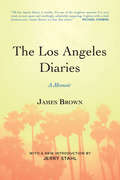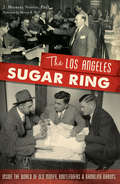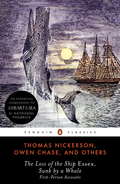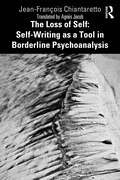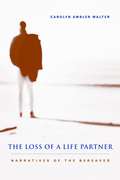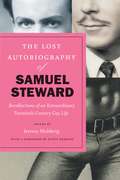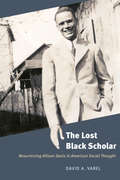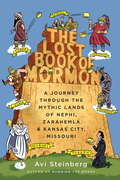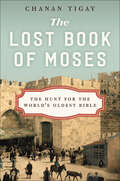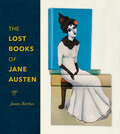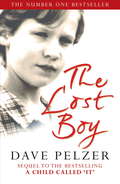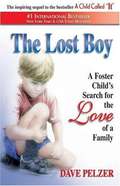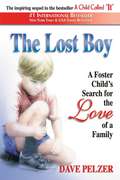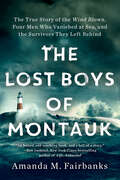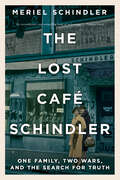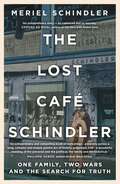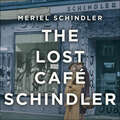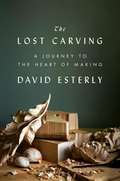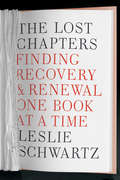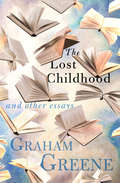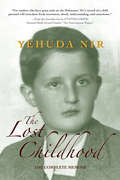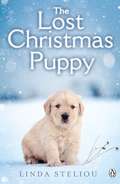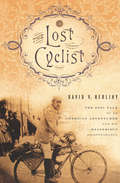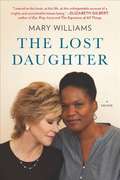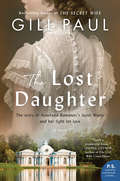- Table View
- List View
The Los Angeles Diaries: A Memoir
by James Brown Jerry StahlPlagued by the suicides of both his siblings, and heir to alcohol and drug abuse, divorce, and economic ruin, James Brown lived a life clouded by addiction, broken promises, and despair.In The Los Angeles Diaries, he reveals his struggle for survival, mining his past to present the inspiring story of his redemption. Beautifully written and limned with dark humor, these twelve deeply confessional, interconnected chapters address personal failure, heartbreak, the trials of writing for Hollywood, and the life-shattering events that finally convinced Brown that he must "change or die."In "Snapshot," Brown is five years old and recalls the night his mother "sets fire to an apartment building down the street." In "Daisy," Brown purchases a Vietnamese potbellied pig for his wife to atone for his sins, only to find the pig's bulk growing in direct proportion to the tensions in his marriage.Harrowing and brutally honest, The Los Angeles Diaries is the chronicle of a man on a collision course with life, who ultimately finds the strength and courage to conquer his demons and believe once more.
The Los Angeles Sugar Ring: Inside the World of Old Money, Bootleggers & Gambling Barons (True Crime Ser.)
by Michael NiottaIn this intimate true crime biography, the author recounts his great grandfather&’s journey from local grocer to Prohibition-era crime boss. Sicilian immigrant &“Big George&” Niotta did exceptionally well for a grocery wholesaler. That&’s because his biggest clients were bootleggers. He delivered hundreds of pounds of sugar to illegal liquor operations across California, supplying an essential ingredient and making sweet profits. But his criminal operations didn&’t end there. Niotta rose to prominence thanks to his magnetic charm, collaborating with infamous bootlegger Frank Borgia and influential gambling baron Jack Dragna. Dogged by the IRS, Niotta expanded his enterprise into ringer horses, a multimillion-dollar lottery, and a notorious gambling parlor. Through extensive research and interviews with family members, J. Michael Niotta explores three decades of L.A. crime, including a rare insider's look at the Eagle Brewing Company and other survivors of Prohibition.
The Loss Of The Ship Essex, Sunk By A Whale
by Nathaniel Philbrick Thomas Philbrick Thomas Nickerson Owen ChaseThe gripping first-hand narrative of the whaling ship disaster that inspired Melville’s Moby-Dick and informed Nathaniel Philbrick’s monumental history, In the Heart of the Sea. In 1820, the Nantucket whaleship Essex was rammed by an angry sperm whale thousands of miles from home in the South Pacific. The Essex sank, leaving twenty crew members drifting in three small open boats for ninety days. Through drastic measures, eight men survived to reveal this astonishing tale. The Narrative of the Wreck of the Whaleship Essex, by Owen Chase, has long been the essential account of the Essex’s doomed voyage. But in 1980, a new account of the disaster was discovered, penned late in life by Thomas Nickerson, who had been the fifteen-year-old cabin boy of the ship. This discovery has vastly expanded and clarified the history of an event as grandiose in its time as the Titanic. This edition presents Nickerson’s never-before-published chronicle alongside Chase’s version. Also included are the most important other contemporary accounts of the incident, Melville’s notes in his copy of the Chase narrative, and journal entries by Emerson and Thoreau. .
The Loss of Self: Self-Writing as a Tool in Borderline Psychoanalysis
by Jean-François ChiantarettoThe Loss of Self considers distinctions and connections between the writing of survival and survival as a mode of being and thinking encountered in analytic work with borderline patients.Jean‑Francois Chiantaretto draws a parallel between Freud’s use of writing in constructing the psychoanalytic edifice and the way each analyst may turn to writing when reflecting on a patient’s analysis. With close reference to the writings of Imre Kertész, the book brings a unique perspective to the literary and historical concept of survival.The Loss of Self will be of interest to psychoanalysts in practice and in training.
The Loss of a Life Partner: Narratives of the Bereaved
by Carolyn Ambler WalterAlthough there is extensive research on the loss of a spouse, predominantly focusing on the experiences of widows, much less attention is paid to bereaved partners not married to their significant other, whether or not the partners are of the same sex. This first-of-its-kind work explores both socially sanctioned and disenfranchised grief, highlighting similarities and differences. Combining a discussion of various theories of grief with personal narratives of grieving men and women drawn from numerous interviews, and detailed case study analysis, Carolyn Ambler Walter has produced a penetrating examination of the bereavement experiences of partners in varying types of relationships. She views narratives of widows, widowers, and bereaved domestic gay and lesbian partners from a postmodern perspective that breaks away from the traditional belief that the living must detach themselves from the dead in order to move on with their lives. Instead, building on the works of postmodern grief theorists such as Klass, Silverman, and Nickman, Walter views ongoing bonds with the dead as a resource for enriching functionality in the present, and as a key to looking to the future.
The Lost Autobiography of Samuel Steward: Recollections of an Extraordinary Twentieth-Century Gay Life
by Scott Herring Samuel Steward Jeremy MulderigOn August 21, 1978, a year before his seventieth birthday, Samuel Steward (1909–93) sat down at his typewriter in Berkeley, California, and began to compose a remarkable autobiography. No one but his closest friends knew the many different identities he had performed during his life: as Samuel Steward, he had been a popular university professor of English; as Phil Sparrow, an accomplished tattoo artist; as Ward Stames, John McAndrews, and Donald Bishop, a prolific essayist in the first European gay magazines; as Phil Andros, the author of a series of popular pornographic gay novels during the 1960s and 1970s. Steward had also moved in the circles of Gertrude Stein, Thornton Wilder, and Alfred Kinsey, among many other notable figures of the twentieth century. And, as a compulsive record keeper, he had maintained a meticulous card-file index throughout his life that documented his 4,500 sexual encounters with more than 800 men. The story of this life would undoubtedly have been a sensation if it had reached publication. But after finishing a 110,000-word draft in 1979, Steward lost interest in the project and subsequently published only a slim volume of selections from his manuscript. In The Lost Autobiography of Samuel Steward, Jeremy Mulderig has integrated Steward’s truncated published text with the text of the original manuscript to create the first extended version of Steward’s autobiography to appear in print—the first sensational, fascinating, and ultimately enlightening story of his many lives told in his own words. The product of a rigorous line-by-line comparison of these two sources and a thoughtful editing of their contents, Mulderig’s thoroughly annotated text is more complete and coherent than either source alone while also remaining faithful to Steward’s style and voice, to his engaging self-deprecation and his droll sense of humor. Compellingly readable and often unexpectedly funny, this newly discovered story of a gay life full of wildly improbable—but nonetheless true—events is destined to become a landmark queer autobiography from the twentieth century.
The Lost Black Scholar: Resurrecting Allison Davis in American Social Thought
by David A. VarelAllison Davis (1902–83), a preeminent black scholar and social science pioneer, is perhaps best known for his groundbreaking investigations into inequality, Jim Crow America, and the cultural biases of intelligence testing. Davis, one of America’s first black anthropologists and the first tenured African American professor at a predominantly white university, produced work that had tangible and lasting effects on public policy, including contributions to Brown v. Board of Education, the federal Head Start program, and school testing practices. Yet Davis remains largely absent from the historical record. For someone who generated such an extensive body of work this marginalization is particularly surprising. But it is also revelatory. In The Lost Black Scholar, David A. Varel tells Davis’s compelling story, showing how a combination of institutional racism, disciplinary eclecticism, and iconoclastic thinking effectively sidelined him as an intellectual. A close look at Davis’s career sheds light not only on the racial politics of the academy but also the costs of being an innovator outside of the mainstream. Equally important, Varel argues that Davis exemplifies how black scholars led the way in advancing American social thought. Even though he was rarely acknowledged for it, Davis refuted scientific racism and laid bare the environmental roots of human difference more deftly than most of his white peers, by pushing social science in bold new directions. Varel shows how Davis effectively helped to lay the groundwork for the civil rights movement.
The Lost Book of Mormon
by Avi SteinbergIs the Book of Mormon the Great American Novel? Decades before Melville and Twain composed their great works, a farmhand and child seer named Joseph Smith unearthed a long-buried book from a haunted hill in western New York State that told of an epic history of ancient America, a story about a family that fled biblical Jerusalem and took a boat to the New World. Using his prophetic gift, Joseph translated the mysterious book into English and published it under the title The Book of Mormon. The book caused an immediate sensation, sparking anger and violence, boycotts and jealousy, curiosity and wonder, and launched Joseph on a wild, decades-long adventure across the American West. Today The Book of Mormon, one of the most widely circulating works of American literature, continues to cause controversy--which is why most of us know very little about the story it tells. Avi Steinberg wants to change that. A fascinated nonbeliever, Steinberg spent a year and a half on a personal quest, traveling the path laid out by Joseph's epic. Starting in Jerusalem, where The Book of Mormon opens with a bloody murder, Steinberg continued to the ruined Maya cities of Central America--the setting for most of the The Book of Mormon's ancient story--where he gallivanted with a boisterous bus tour of believers exploring Maya archaeological sites for evidence. From there the journey took him to upstate New York, where he participated in the true Book of Mormon musical, the annual Hill Cumorah Pageant. And finally Steinberg arrived at the center of the American continent, Jackson County, Missouri, the spot Smith identified as none other than the site of the Garden of Eden.Threaded through this quirky travelogue is an argument for taking The Book of Mormon seriously as a work of American imagination. Literate and funny, personal and provocative, the genre-bending The Lost Book of Mormon boldly explores our deeply human impulse to write bibles and discovers the abiding power of story.From the Hardcover edition. about us. And also an answer to the question: Why are we so afraid of the Book of Mormon? Literate and funny, personal and provocative, the genre-bending Lost Book of Mormon boldly explores our deeply human impulse to write bibles and discovers the abiding power of story.
The Lost Book of Moses: The Hunt for the World's Oldest Bible
by Chanan TigayA gripping account of one man’s quest to find the world’s oldest Bible and learn about the brilliant, doomed antiquities dealer accused of forging it.In 1883, Moses Wilhelm Shapira—archaeological treasure hunter, inveterate social climber, and denizen of Jerusalem’s bustling marketplace—arrived unannounced in London claiming to have discovered the world’s oldest Bible scroll in a desert cave east of the Dead Sea. With his phenomenal find, Shapira swiftly became world famous—but, just as quickly, his scroll was discredited as a clever forgery. With the discovery of the eerily similar Dead Sea Scrolls in 1947, however, investigators reopened the case, wondering whether Shapira had, in fact, discovered the first Dead Sea Scroll, seven decades before the rest. Here, in a globetrotting narrative with all the suspense of a classic detective story, award-winning journalist Chanan Tigay sets out to find the scrolls and determine Shapira’s guilt or innocence for himself.
The Lost Books of Jane Austen
by Janine BarchasHardcore bibliography meets Antiques Roadshow in an illustrated exploration of the role that cheap reprints played in Jane Austen's literary celebrity—and in changing the larger book world itself.Gold Winner of the 2019 Foreword INDIES Award for History by FOREWORD ReviewsIn the nineteenth century, inexpensive editions of Jane Austen's novels targeted to Britain's working classes were sold at railway stations, traded for soap wrappers, and awarded as school prizes. At just pennies a copy, these reprints were some of the earliest mass-market paperbacks, with Austen's beloved stories squeezed into tight columns on thin, cheap paper. Few of these hard-lived bargain books survive, yet they made a substantial difference to Austen's early readership. These were the books bought and read by ordinary people. Packed with nearly 100 full-color photographs of dazzling, sometimes gaudy, sometimes tasteless covers, The Lost Books of Jane Austen is a unique history of these rare and forgotten Austen volumes. Such shoddy editions, Janine Barchas argues, were instrumental in bringing Austen's work and reputation before the general public. Only by examining them can we grasp the chaotic range of Austen's popular reach among working-class readers. Informed by the author's years of unconventional book hunting, The Lost Books of Jane Austen will surprise even the most ardent Janeite with glimpses of scruffy survivors that challenge the prevailing story of the author's steady and genteel rise. Thoroughly innovative and occasionally irreverent, this book will appeal in equal measure to book historians, Austen fans, and scholars of literary celebrity.
The Lost Boy
by Dave PelzerDave Pelzer's sequel to million-copy bestseller A CHILD CALLED 'IT'As a child, Dave Pelzer was brutally beaten and starved by his mother. The world knew nothing of his living nightmare and he had nothing and no one to turn to. But his dreams kept him alive - dreams of someone taking care of him, loving him and calling him their son. Finally, his horrific plight could no longer be hidden from the outside world and Dave's life radically changed.THE LOST BOY is the harrowing, but ultimately uplifting true story of a boy's journey through the foster-care system in search of a family to love. The continuation of Dave Pelzer's story is a moving sequel and inspirational read for all.
The Lost Boy: A Foster Child's Search for the Love of a Family
by Dave PelzerImagine a young boy who has never had a loving home. His only possessions are the old, torn clothes he carries in a paper bag. The only world he knows is one of isolation and fear. Although others had rescued this boy from his abusive alcoholic mother, his real hurt is just beginning -- he has no place to call home. This is Dave Pelzer's long-awaited sequel to A Child Called "It". In The Lost Boy, he answers questions and reveals new adventures through the compelling story of his life as an adolescent. Now considered an F-Child (Foster Child), Dave is moved in and out of five different homes. He suffers shame and experiences resentment from those who feel that all foster kids are trouble and unworthy of being loved just because they are not part of a "real" family. Tears, laughter, devastation and hope create the journey of this little lost boy who searches desperately for just one thing -- the love of a family.
The Lost Boy: A Foster Child's Search for the Love of a Family (Windsor Selection Ser.)
by Dave PelzerImagine a young boy who has never had a loving home. His only possesions are the old, torn clothes he carries in a paper bag. The only world he knows is one of isolation and fear. Although others had rescued this boy from his abusive alcoholic mother, his real hurt is just begining -- he has no place to call home. This is Dave Pelzer's long-awaited sequel to A Child Called "It". In The Lost Boy, he answers questions and reveals new adventures through the compelling story of his life as an adolescent. Now considered an F-Child (Foster Child), Dave is moved in and out of five different homes. He suffers shame and experiences resentment from those who feel that all foster kids are trouble and unworthy of being loved just because they are not part of a "real" family. Tears, laughter, devastation and hope create the journey of this little lost boy who searches desperately for just one thing -- the love of a family.
The Lost Boys of Montauk: The True Story of the Wind Blown, Four Men Who Vanished at Sea, and the Survivors They Left Behind
by Amanda M. FairbanksAn immersive account of a tragedy at sea whose repercussions haunt its survivors to this day, lauded by New York Times bestselling author Ron Suskind as &“an honest and touching book, and a hell of a story.&”In March of 1984, the commercial fishing boat Wind Blown left Montauk Harbor on what should have been a routine offshore voyage. Its captain, a married father of three young boys, was the boat&’s owner and leader of the four-man crew, which included two locals and the blue-blooded son of a well-to-do summer family. After a week at sea, the weather suddenly turned, and the foursome collided with a nor&’easter. They soon found themselves in the fight of their lives. Tragically, it was a fight they lost. Neither the boat nor the bodies of the men were ever recovered. The fate of the Wind Blown—the second-worst nautical disaster suffered by a Montauk-based fishing vessel in over a hundred years—has become interwoven with the local folklore of the East End&’s year-round population. Back then, on the easternmost tip of Long Island, before Wall Street and hedge fund money stormed into town, commercial fishing was the area&’s economic lifeblood. Amanda M. Fairbanks examines the profound shift of Montauk from a working-class village—&“a drinking town with a fishing problem&”—to a playground for the ultra-wealthy, seeking out the reasons that an event more than three decades old remains so startlingly vivid in people&’s minds. She explores the ways in which deep, lasting grief can alter people&’s memories. And she shines a light on the powerful and sometimes painful dynamics between fathers and sons, as well as the secrets that can haunt families from beyond the grave. The story itself is a universal tale of family and brotherhood; it&’s about what happens when the dreams and ambitions of affluent and working-class families collide. Captivating and powerful, The Lost Boys of Montauk explores one of the most important questions we face as humans: how do memories of the dead inform the lives of those left behind?
The Lost Café Schindler: One Family, Two Wars, And The Search For Truth
by Meriel Schindler"An extraordinary and compelling book of reckonings." —Philippe Sands An extraordinary memoir of a Jewish family spanning two world wars and its flight from Nazi-occupied Austria. Meriel Schindler spent her adult life trying to keep her father, Kurt, at bay. But when he died in 2017, he left behind piles of Nazi-era documents related to her family’s fate in Innsbruck, Austria, and a treasure trove of family albums reaching back to before World War I. Meriel was forced to confront not only their fractured relationship, but also the truth behind their family history. The Lost Café Schindler re-creates the journey of an extraordinary family, whose relatives included the Jewish doctor who treated Hitler’s mother when she was dying of breast cancer; the Kafka family; and Alma Schindler, the wife of Gustav Mahler. The narrative centers around the Café Schindler, the social hub of Innsbruck. Famous for its pastries, home-distilled liquors, live entertainment, and hospitality, the restaurant attracted Austrians from all walks of life. But as conditions became untenable for Jews in Austria during the Nazi era, the Schindlers were forced to leave, and their café was expropriated. Meriel reconstructs the color and vibrancy of life in prewar Innsbruck against the majestic backdrop of the Austrian Alps, as well as the creeping menace and, finally, terror of the Nazi occupation. Ultimately, The Lost Café Schindler is a story of tragic loss—several relatives disappeared in Terezín and Auschwitz—but also one of reclamation and reconciliation. Beautifully written, it is an unforgettable portrait of an era and a testament to the pull of family history on future generations.
The Lost Café Schindler: One family, two wars and the search for truth
by Meriel Schindler'Rigorously researched, The Lost Café Schindler successfully weaves together a compelling and at times deeply moving memoir and family history that also chronicles the wider story of the Jews of the Austro-Hungarian Empire... It distinguishes itself through its combination of mystery and reconciliation.' -- The Times T2'In tilling the past Meriel has uncovered the most fascinating - and devastating - family history. The Lost Cafe Schindler is not just a genealogical exploration, though; it sets out the wider experiences of the Jewish population of the Austro-Hungarian empire, weaving in the story of how antisemitism took root' -- Sunday Times'An impressively researched account of Jewish life in the Tyrol up to and during the Second World War' -- Evening Standard'An extraordinary story - so cadenced and so moving.' -- Edmund de Waal, author of The Hare with Amber Eyes'An extraordinary and compelling book of reckonings - a journey across a long, complex and deeply painful arc of history, grippingly told - a wonderful melding of the personal and the political, the family and the historical.' -- Philippe Sands, author of East West Street'A significant benefit for family historians is that her reading, sources and resources offer guidance that others might follow and use in their own research.' Who Do You Think You Are?'A well-researched account.' -- The Observer'The scale of the crimes committed during these years can never be fully comprehended, but through tales like these they become relatable and the sense of loss, shared.' -- Press Association'Compelling and beautifully written... a remarkable and inspiring story that attests to the strength and compassion of the human spirit in overcoming the tragedy of persecution... Fascinating family history.' - Daily Express'Schindler builds her story patiently, tracking her own journey in unravelling it' - i***Kurt Schindler was an impossible man. His daughter Meriel spent her adult life trying to keep him at bay. Kurt had made extravagant claims about their family history. Were they really related to Franz Kafka and Oscar Schindler, of Schindler's List fame? Or Hitler's Jewish doctor - Dr Bloch? What really happened on Kristallnacht, the night that Nazis beat Kurt's father half to death and ransacked the family home? When Kurt died in 2017, Meriel felt compelled to resolve her mixed feelings about him, and to solve the mysteries he had left behind. Starting with photos and papers found in Kurt's isolated cottage, Meriel embarked on a journey of discovery taking her to Austria, Italy and the USA. She reconnected family members scattered by feuding and war. She pieced together an extraordinary story taking in two centuries, two world wars and a family business: the famous Café Schindler. Launched in 1922 as an antidote to the horrors of the First World War, this grand café became the whirling social centre of Innsbruck. And then the Nazis arrived. Through the story of the Café Schindler and the threads that spool out from it, this moving book weaves together memoir, family history and an untold story of the Jews of the Austro-Hungarian Empire. It explores the restorative power of writing, and offers readers a profound reflection on memory, truth, trauma and the importance of cake.
The Lost Café Schindler: One family, two wars and the search for truth
by Meriel SchindlerKurt Schindler was an impossible man. His daughter Meriel spent her adult life trying to keep him at bay. Kurt had made extravagant claims about their family history. Were they really related to Franz Kafka and Oscar Schindler, of Schindler's List fame? Or Hitler's Jewish doctor - Dr Bloch? What really happened on Kristallnacht, the night that Nazis beat Kurt's father half to death and ransacked the family home? When Kurt died in 2017, Meriel felt compelled to resolve her mixed feelings about him, and to solve the mysteries he had left behind. Starting with photos and papers found in Kurt's isolated cottage, Meriel embarked on a journey of discovery taking her to Austria, Italy and the USA. She reconnected family members scattered by feuding and war. She pieced together an extraordinary story taking in two centuries, two world wars and a family business: the famous Café Schindler. Launched in 1922 as an antidote to the horrors of the First World War, this grand café became the whirling social centre of Innsbruck. And then the Nazis arrived. Through the story of the Café Schindler and the threads that spool out from it, this moving book weaves together memoir, family history and an untold story of the Jews of the Austro-Hungarian Empire. It explores the restorative power of writing, and offers readers a profound reflection on memory, truth, trauma and the importance of cake.(P) 2021 Hodder & Stoughton Ltd
The Lost Carving
by David Esterly"A beautiful, intricate meditation on creativity and discovery, on fire and rebirth. ” -Elizabeth Gilbert Awestruck at the sight of a Grinling Gibbons carving in a London church, David Esterly chose to dedicate his life to woodcarving-its physical rhythms, intricate beauty, and intellectual demands. Forty years later, he is the foremost practitioner of Gibbons’s forgotten technique, which revolutionized ornamental sculpture in the late 1600s with its spectacular cascades of flowers, fruits, and foliage. After a disastrous fire at Henry VIII’s Hampton Court Palace, Esterly was asked to replace the Gibbons masterpiece destroyed by the flames. It turned out to be the most challenging year in Esterly’s life, forcing him to question his abilities and delve deeply into what it means to make a thing well. Written with a philosopher’s intellect and a poet’s grace, The Lost Carving explores the connection between creativity and physical work and illuminates the passionate pursuit of a vocation that unites head and hand and heart. .
The Lost Chapters: Finding Recovery and Renewal One Book at a Time
by Leslie SchwartzLeslie Schwartz's powerful, skillfully woven memoir of redemption and reading, as told through the list of books she read as she served a 90 day jail sentence In 2014, novelist Leslie Schwartz was sentenced to 90 days in Los Angeles County Jail for a DUI and battery of an officer. It was the most harrowing and holy experience of her life.Following a 414-day relapse into alcohol and drug addiction after more than a decade clean and sober, Schwartz was sentenced and served her time with only six months' sobriety. The damage she inflicted that year upon her friends, her husband, her teenage daughter, and herself was nearly impossible to fathom. Incarceration might have ruined her altogether, if not for the stories that sustained her while she was behind bars--both the artful tales in the books she read while there, and, more immediately, the stories of her fellow inmates. With classics like Edith Wharton's Ethan Frome to contemporary accounts like Laura Hillenbrand's Unbroken, Schwartz's reading list is woven together with visceral recollections of both her daily humiliations and small triumphs within the county jail system. Through the stories of others--whether rendered on the page or whispered in a jail cell--she learned powerful lessons about how to banish shame, use guilt for good, level her grief, and find the lost joy and magic of her astonishing life. Told in vivid, unforgettable prose, The Lost Chapters uncovers the nature of shame, rage, and love, and how instruments of change and redemption come from the unlikeliest of places.
The Lost Childhood: And Other Essays
by Graham GreeneFrom Dickens to Wilde—literary criticism and personal reflections by a master &“unmatched . . . in his uncanny psychological insights&” (The New York Times). Graham Greene shares his love affair with reading in this collection of essays, memories, and critical considerations, both affectionate and tart, &“[that] could have come from no other source than the author of Brighton Rock and The Power and the Glory&” (The Scotsman). Whether following the obsessions of Henry James, marveling at the &“indispensible&” Beatrix Potter, or exploring the Manichean world of Oliver Twist, Graham Greene revisits the books and authors of his lifetime. Here is Greene on Fielding, Doyle, Kipling, and Conrad; on The Prisoner of Zenda and the &“revolutionary . . . colossal egoism&” of Laurence Stern&’s epic comic novel, Tristram Shandy; on the adventures of both Allan Quatermain and Moll Flanders; and more. Greene strolls among the musty oddities and folios sold on the cheap at an outdoor book mart, tells of a bizarre literary hoax perpetrated on a hapless printseller in eighteenth-century Pall Mall, and in the titular essay, reveals the book that unlocked his imagination so thoroughly that he decided to write forever. For Greene, &“all the other possible futures slid away.&” In this prismatic gallery of profound influences and guiltless pleasures, Greene proves himself &“so intensely alive that the reader cannot but respond to the dazzling combination of intelligence and strong feeling&” (Edward Sackville West).
The Lost Childhood: The Complete Memoir
by Yehuda NirThis compelling memoir takes readers through the eyes of a child surviving World War II in Nazi-occupied Poland. As a nine-year-old, the author witnessed his father being herded into a truck—never to be seen again. He, his mother, and sister fled to Warsaw to live in disguise as Catholics under the noses of the Nazi SS, constantly fearful of discovery and persecution. A sobering reminder of the personal toll of the Holocaust on Jews during World War II, this book is a harrowing portrait of one child's loss of innocence. This edition contains previously unpublished content from the original text.
The Lost Christmas Puppy
by Linda SteliouLittle Linda was three years old when she told Father Christmas a secret. 'What I want more than anything is to have a puppy of my own to love'. But with every Christmas that went by, no puppy appeared. Linda grew into a busy working mum and wife, and her dreams of a puppy were pushed to the back of her mind. It wasn't until a special visitor one Christmas Eve, that she began to remember the wish she had made sixty years earlier. . .Fans of Christmas at the Ragdoll Orphanage and The Lost Christmas Puppy will love this book full of charming and touching stories. This is an unforgettable true story about childhood, love, and how an animal can change anyone's life.
The Lost Cyclist: The Epic Tale of an American Adventurer and His Mysterious Disappearance
by David V. HerlihyThis &“fascinating&” story of a nineteenth-century mystery &“should appeal to most lovers of history, as well as to bicycling enthusiasts. Strongly recommended&” (Library Journal). In the late 1880s, Frank Lenz of Pittsburgh, a renowned high-wheel racer and long-distance tourist, dreamed of cycling around the world. He finally got his chance by recasting himself as a champion of the downsized &“safety-bicycle&” with inflatable tires, the forerunner of the modern road bike that was about to become wildly popular. In the spring of 1892 he quit his accounting job and gamely set out west to cover twenty thousand miles over three continents as a correspondent for Outing magazine. Two years later, after having survived countless near disasters and unimaginable hardships, he approached Europe for the final leg. Lenz never made it. His mysterious disappearance in eastern Turkey sparked an international outcry and compelled Outing to send William Sachtleben, another larger-than-life cyclist, on Lenz&’s trail. Bringing to light a wealth of information, David Herlihy&’s gripping narrative captures the soaring joys and constant dangers accompanying the bicycle adventurer in the days before paved roads and automobiles. This untold story culminates with Sachtleben&’s heroic effort to bring Lenz&’s accused murderers to justice, even as troubled Turkey teetered on the edge of collapse.
The Lost Daughter
by Mary WilliamsA daughter of the Black Panther movement tells her remarkable life story of being raised amid violence and near-poverty, adopted as a teenager by Jane Fonda, and finding her way back home. As she grew up in 1970s Oakland, California, role models for Mary Williams were few and far between: her father was often in prison, her older sister was a teenage prostitute, and her hot-tempered mother struggled to raise six children alone. When Mary was thirteen, a silver lining appeared in her life: she was invited to spend a summer at Laurel Springs Children's Camp, run by Jane Fonda and her then husband, Tom Hayden. Mary flourished at camp, and over the course of several summers, she began confiding in Fonda about her difficulties at home. During one school year, Mary suffered a nightmare assault crime, which she kept secret until she told a camp counselor and Fonda. After providing care and therapy for Mary, Fonda invited her to come live with her family. Practically overnight, Mary left the streets of Oakland for the star-studded climes of Santa Monica. Jane Fonda was the parent Mary had never had--outside the limelight and Hollywood parties, Fonda was a wonderful mom who helped with homework, listened to adolescent fears, celebrated achievements, and offered inspiration and encouragement at every turn. Mary's life since has been one of adventure and opportunity--from hiking the Appalachian Trail solo, working with the Lost Boys of Sudan, and living in the frozen reaches of Antarctica. Her most courageous trip, though, involved returning to Oakland and reconnecting with her biological mother and family, many of whom she hadn't seen since the day she left home. The Lost Daughter is a chronicle of her journey back in time, an exploration of fractured family bonds, and a moving epic of self-discovery.
The Lost Daughter: A Novel
by Gill PaulIf you loved I Am Anastasia by Ariel Lawhon you won't want to miss this novel about her sister, Grand Duchess Maria. What really happened to this lost Romanov daughter? A new novel perfect for anyone curious about Anastasia, Maria, and the other lost Romanov daughters, by the author of The Secret Wife. 1918: Pretty, vivacious Grand Duchess Maria Romanov, the nineteen-year-old daughter of the fallen Tsar Nicholas II, lives with her family in suffocating isolation, a far cry from their once-glittering royal household. Her days are a combination of endless boredom and paralyzing fear; her only respite are clandestine flirtations with a few of the guards imprisoning the family—never realizing her innocent actions could mean the difference between life and death1973: When Val Doyle hears her father’s end-of-life confession, “I didn’t want to kill her,” she’s stunned. So, she begins a search for the truth—about his words and her past. The clues she discovers are baffling—a jewel-encrusted box that won’t open and a camera with its film intact. What she finds out pulls Val into one of the world’s greatest mysteries—what truly happened to the Grand Duchess Maria?
